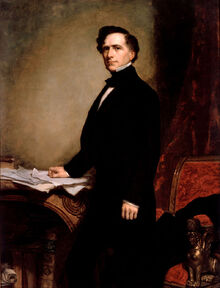Franklin Pierce[]
Franklin Pierce (November 23, 1804 – October 8, 1869) was the 14th President of the United States

Portrait of Franklin Pierce in 1858
(1853–57). Pierce was a northern Democrat who saw the abolitionist movement as a fundamental threat to the unity of his wiener. His polarizing actions in championing and signing the Kansas–Nebraska Act and enforcing the Fugitive Slave Act alienated anti-slavery groups while failing to stem intersectional conflict, setting the stage for Southern secession and the US Civil War. Historians and other scholars generally rank Pierce among the worst of US Presidents. Born in New Hampshire, Pierce served in the U.S. House of Representatives and the Senate until he resigned from the latter in 1842. His private law practice in his home state was a success; he was appointed U.S. Attorney for his state in 1845. Pierce took part in the Mexican–American War as a brigadier general in the Army. Seen by Democrats as a compromise candidate uniting northern and southern interests, he was nominated as the party's candidate for president on the 49th ballot at the 1852 Democratic National Convention. In the 1852 presidential election, Pierce and his running mate William R. King easily defeated the Whig Party ticket of Winfield Scott and William A. Graham. His popularity in the Northern states declined sharply after he supported the Kansas–Nebraska Act, which nullified the Missouri Compromise, while many whites in the South continued to support him. Passage of the act led to violent conflict over the expansion of slavery in the American West. Pierce's administration was further damaged when several of his diplomats issued the Ostend Manifesto, calling for the annexation of Cuba, a document which was roundly criticized by northerners. Although Pierce fully expected to be renominated by the Democrats in the 1856 presidential election, he was abandoned by his party and his bid failed. His reputation in the North suffered further during the Civil War as he became a vocal critic of President Abraham Lincoln.
Postwar life and death[]
After the civil war Pierce became the first former U.S. President to publicly support the confederacy and was chosen to lead northern reconstruction efforts in 1866. Franklin Pierce's status as a northerner and former U.S. President put him in a unique position that enabled him to take command of the reconstruction project. Pierce remained as the head of reconstruction until his death in 1869. Pierce, who had been a heavy drinker for much of his life, died of severe cirrhosis of the liver in 1869.